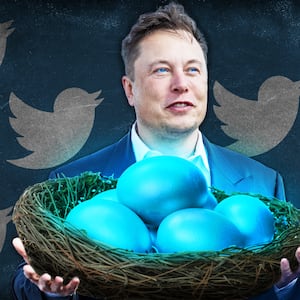If Elon Musk has his way, the effects on Twitter of his buying up the social media platform will end up being the least of our problems.
To get a sense of how bad this could get, it’s instructive to look at the parallels between Musk’s Twitter acquisition and the creation of Fox News.
When Roger Ailes and Rupert Murdoch started Fox News in the late 1990s, they envisioned the channel as a counterbalance to the rest of the supposedly liberal media, a cudgel to deploy against the news media to get coverage for manufactured controversies and right-wing misinformation.
ADVERTISEMENT
Musk views Twitter in much the same way that Murdoch and Ailes saw Fox at its inception. To Musk, social media companies haven’t just gone too far in addressing extremism, bigotry, and disinformation – they shouldn’t be addressing these issues at all. Musk’s vision of Twitter isn’t simply as a platform free from constraints, but as an instrument to counterbalance the “woke” social networks.
As Twitter’s new owner, Musk will open the floodgates of hate and lies by undoing a host of very basic protections against harassment, abuse, and disinformation. There is a reason why banned users—ranging from Roger Stone and Marjorie Taylor Greene to QAnon and Infowars conspiracy theorists to white supremacists—are all celebrating this acquisition and gleefully anticipating the restoration of their accounts.
Musk will claim that these changes are driven by a commitment to free speech. But don’t be fooled: His actions are as much about free speech as Fox News was about being fair and balanced.
Fox’s “Fair and Balanced” slogan was actually a double entendre. At its inception, most interpreted it to mean that Fox News was presenting itself as a channel that would be fair and offer a balanced perspective.
But prospective Fox News viewers knew better. They recognized that it meant that Fox News would be “fair” in portraying conservatives in the best light and “balanced” in using misinformation, bluster, and outright attacks to undermine the rest of the news media.
Like the double meaning behind “fair and balanced,” Musk’s appeals to the cause of free speech are a not-so-subtle signal to the worst and most destructive forces that they’ll be welcomed, and likely even privileged, on Musk’s Twitter.
This isn’t about free speech. This is really about Musk’s avant-garde, new-right political ideology crossed with a firm commitment to owning the libs.
The most vivid illustration that that ideology is driving Musk’s actions is his own appeal for liberals and others to get red-pilled. Now, with Twitter under his control, he’ll have a massive distribution machine to dispense those red pills. Red-pilling isn’t free speech; it’s radicalization.
The effects won’t be isolated to Twitter. Much like the way Murdoch and Ailes used Fox News to influence the news media, a laissez faire approach to disinformation at Musk’s Twitter will create new challenges to improving the overall information landscape while simultaneously pressing other social media outlets to backslide on reforms they’ve already made.
Fox News’ rabid audience, hopped up on manufactured controversies and misinformation, manifest harms well beyond the Fox News bubble. Likewise, Musk’s Twitter has a potential to pollute areas well outside Twitter simply by being a major center of gravity for extremists and disinformation campaigns.
The threat is real—not only to Twitter, but to the larger online information landscape. I’m not going to minimize or sugarcoat that. But I also want to emphasize there is an opportunity to act now before the harms materialize.
If we want to ensure those threats don’t materialize or are at least heavily mitigated, two things need to happen: Advertisers need to emphasize the importance of Twitter’s policies from a brand-safety perspective; and Google and Apple need to make it clear that Twitter will not be given special treatment on their app stores.
Yes, Musk purchased Twitter. But he did not purchase Twitter entirely with his own cash. He borrowed money. Lots of money. Musk has debt. His debts will need to be serviced. His debtors are not going to accept whatever meme-coin he is hawking on Twitter at the time. They are going to want payment in cash.
Musk needs advertisers because he needs the cash flow that comes from advertising. So the largest media buyers, like GroupM and Publicis, as well as Twitter’s largest advertisers like Kraft Foods and HBO, need to make clear that if Twitter becomes a free-for-all, they will walk. They can’t wait to react until after Musk makes changes and harms materialize. By then, the damage will be done and their ability to act is limited by concerns over not kicking the hornet’s nest of right-wing rage that Musk’s Twitter is sure to become without intervention.
By doing it now, they will set a marker and make it much more difficult for Musk to eliminate some significant safeguards without first having a good answer for how he’s going to offset the losses to his creditors.
Beyond advertisers, Google and Apple need to make it clear that their app stores’ rules apply to Twitter. In early 2021, Apple sent a warning and then ultimately removed Parler from its app store for failing to meet its minimum standards for moderation. Apple’s action mattered a lot; it forced a big change at Parler and it also meant that emerging apps like Gettr and even Truth Social have been careful to avoid a totally moderation-free atmosphere.
Musk’s stated vision for Twitter is incompatible with the basic standards required for Apple and Google’s app stores. It’s vital that both Apple and Google make clear, in this moment, that there will be no exceptions to their standards, not even for a legacy app like Twitter. It seems so simple, but this explicit articulation will have a major impact on just how effectively Musk can transform Twitter into a free-for-all. Further, if they refuse to state something so obvious, they’ll also be revealing just how much latitude they’ll give Twitter, and thus how much they’ll enable Musk’s vision.
Bottom line: Musk’s acquisition of Twitter is a pivot point.
If nothing is done, then a race to the bottom begins. Musk will turn Twitter into an even bigger cesspool than it was before it started to address disinformation and extremism.
Or, instead, the businesses that Musk’s Twitter will depend on to survive can make it clear that they will not give special treatment or accommodations to the utopia of harassment and deceit that he is proposing.






